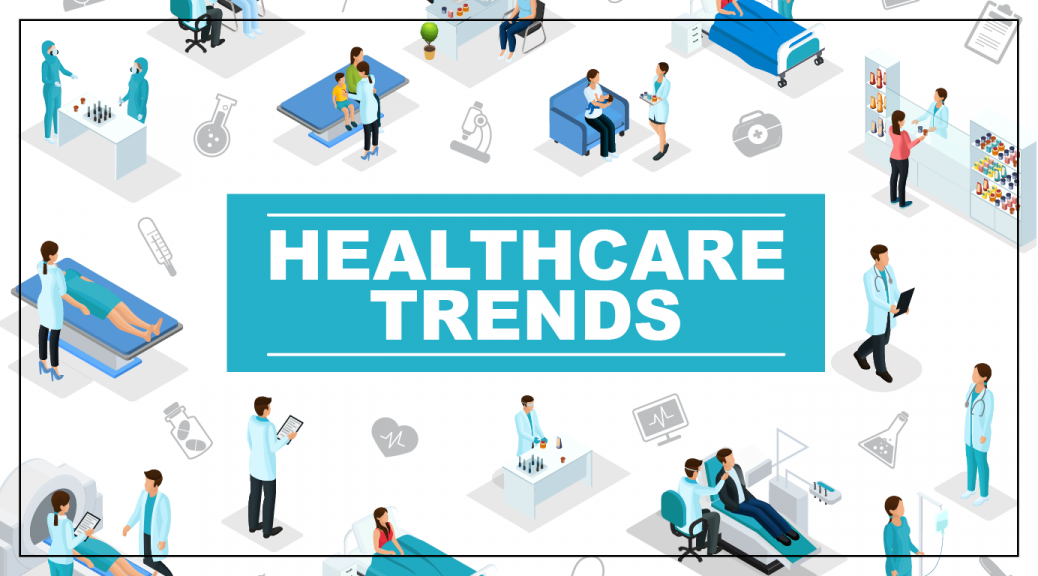Undoubtedly, during the global pandemic, a lot of innovative healthcare trends have emerged. COVID-19 has transformed every aspect of our lives, above all, the healthcare industry. Healthcare software development has been at the forefront, ever since.
Even though the healthcare industry has been pretty slow and behind in deploying healthcare software projects, digitization is bridging the gap. More so amid the pandemic, when people around the world have been reluctant to step out of their houses, they started to favor digital healthcare tools and remote services rather than physically going to the hospitals. Almost 60% of younger healthcare professionals consider telehealth. Moreover, the global telehealth market is anticipated to grow from $25.4 billion in 2020 to $55.6 billion by 2025.
Healthcare Technology Trends 2021
Below are some of the top healthcare industry trends in 2021. These healthcare trends provide a glimmer of hope for both patients and doctors alike, to accelerate better services and innovation as we move forward in 2021.
Virtual Care
Virtual care gained popularity last year especially because of the COVID-19 pandemic, therefore, has become one of the most significant health and wellness trends that we will continue to see and experience in 2021. It allows patients to receive the same level of healthcare services from the comfort of their homes, without having to step out. According to Forrester, virtual visits had hit one billion by the end of 2020.
Additionally, one-third of the virtual appointments will be associated with mental health and online therapies. Remote care is becoming a part of long term strategies and will continue even after the pandemic ends. Virtual healthcare is suitable for both patients with serious disease symptoms and also with mild.
Electronic Health Records
EHR enables hospitals to not only provide better care to patients but also automate administrative tasks. It lets doctors exchange patient information remotely and in real-time, and also complete patient history can be maintained through a single portal for future diagnosis. A lot of healthcare providers are seeking healthcare software development services to develop highly customizable solutions according to their requirements. TatvaSoft, Invozone, PDX Inc. are some of the top custom healthcare software development companies, just to name a few.
Artificial Intelligence
AI-based healthcare software solutions are trending since it has massive potential for improving health care services. Artificial intelligence brings endless possibilities for the healthcare sector in terms of speed and accurate diagnosis of a disease. Through AI and ML drug development can be refined and upgraded which will accelerate the entire medicine development process. Moreover, AI can predict mental health issues for mental well-being. The most popular AI-based trend is Chabot technology. Healthcare software developers are facilitating healthcare providers on Chabot development to assist patients with the efficient self-diagnosis.
Internet of ‘Medical’ Things
According to studies, the IoT industry will be worth $6.2 trillion by 2025. Several mobile applications and wearable devices have been developed to monitor health. IoMT includes wearable devices such as heart rate monitors, blood pressure monitors, glucose level readings, etc. Such devices can reduce unnecessary visits to healthcare facilities and enable instant access to timely diagnosis. According to Frost & Sullivan’s analysis, the global IoMT market was worth $22.5 billion in 2016; it is anticipated to reach $72.02 billion by 2021. Therefore, healthcare software development companies are developing applications for wearable tech to support IoMT.
Also Read This Article: Can EHRs Help Fight the Opioid Crisis?
Virtual and Augmented Reality
AR and VR both are very impactful technologies that can boost the quality of healthcare services. AR/VR technologies are more suitable for medical students and practitioners for education purposes. Students can practice surgical training programs using simulations. Moreover, it can help patients to overcome motor deficiency through VR/VR based environments. The data collected through simulations can help doctors to provide personalized care. Additionally, in senior care communities that cannot travel, VR can provide immersive experiences that can prove to be very therapeutic.
Wrapping Up
Technological developments anticipate to continue and grow across the healthcare ecosystem. Every hospital focused on developing health solutions and applications for instant patient care. Because the global Pandemic has proved that health is important for not only the physical but also for the economic well-being of the country. Therefore, smart organizations will deploy custom digital tools to meet the collective needs of global communities and custom healthcare software development companies enable healthcare institutions to bridge the gap.
















